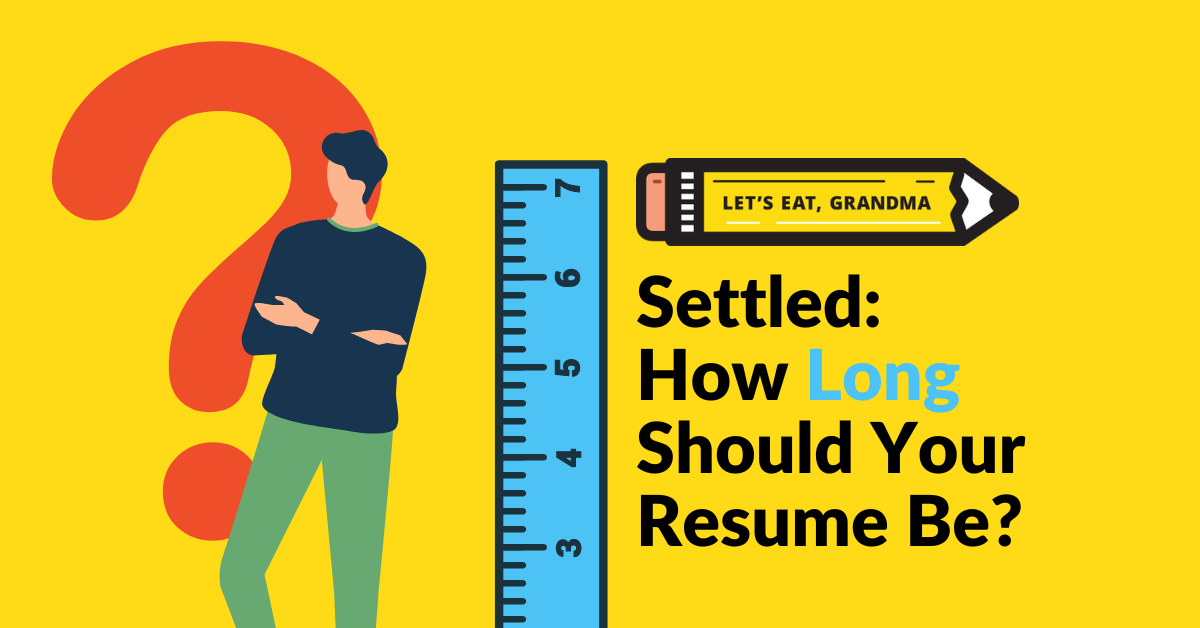How Long Should Your Resume Be?

Is the perfect length for a resume still up in the air? Not any more. Get clarity on the right resume length in this guide.
Editor’s note: This post was originally published in October 2022; it has been updated for accuracy and comprehensiveness.
By: Reem Abouemera | Contributor for Let’s Eat, Grandma
Resume length: the great debate. Whenever the subject comes up, you’re sure to find all kinds of conflicting opinions.
On one side, you have the “one-page wonder” proponents who believe that anything more than one page is overkill and will only serve to distract recruiters from the most important information.
On the other side, you have those who argue that a two-page resume gives you more space to showcase your experience and qualifications if you have a lot to offer.
Should the topic be dropped altogether, then?
No. Resume length is definitely something worth thinking about because it’s important to strike the right balance between being attention-grabbing and appearing qualified enough for a job.
The question is, then: how long should your resume be? Let’s talk about the details.
Ready for more job search help?
Sign up for a free Senior Writer Resume Critique to see what's holding you back from landing interviews. One of our top professional resume writers will give you personalized feedback on the top 3 items you can improve based on our expert practices!
So, how long should my resume be?

Your resume needs to be long enough to contain all the relevant information, but short enough to keep the hiring manager’s attention. Photo by Steve Ding on Unsplash
The short answer is that your resume should be as long as it needs to be to convey your experience and qualifications effectively, but short enough to remain interesting and not overwhelm recruiters. At Let’s Eat, Grandma, 95%+ of the resumes we write will either be one or two pages, and we’ve found that to be the sweet spot for most job seekers.
For the most part, one page should be plenty if you’re early in your career or don’t have much experience to showcase. The more (relevant) experience you have, the more likely it is that your resume will run to two pages.
With that in mind, don’t feel like you need to include everything just because it fits. The goal is to create a lean, mean job-hunting machine that’s targeted, relevant, and engaging.
Pro Tip: In the initial hiring stages, especially at large companies that receive lots of resumes for a position, recruiters and hiring managers may use excessive length as a reason to disqualify resumes. This is because they know there’s a higher chance the resume will include irrelevant information. So, if your resume is over two pages, it’s best to go through it and see what you can cut.
Not sure if your resume is the right length? Submit it for a free critique by one of our senior resume writers.
Is there a rule I can use?
No, there are no absolutes or hard-and-fast rules regarding resume length. Accordingly, take any definitive statements you see or hear with a grain of salt. (For example, “if you have less than 10 years of experience, never go above one page”).
Several factors can affect the appropriate length of your resume, including:
- Your level of experience
- The type of job you’re applying for
- Whether you’re transitioning careers
With that said, this Let’s Eat, Grandma flowchart considers these factors and provides guidance on what resume length is best for your specific situation.
How to make sure your resume is the right length
Targeted and careful editing will ensure your resume is at the right length. Photo by Kelly Sikkema on Unsplash
Here are a few tips to make sure your most important accomplishments stand out, no matter the length of your resume:
Lead with the most relevant, interesting information
Since recruiters and hiring managers often only give your resume a cursory glance at first, make sure everything you include is up to date and relevant to the job description.
This includes starting your resume with a Summary of Qualifications that shows how your experience has prepared you to excel in the role you want. Think of it as your resume’s elevator pitch—you want to hook the recruiter immediately and keep them engaged.
For your Professional Experience section, you want to make sure you highlight accomplishments from the last 10-15 years that you know a hiring manager for the role you want will find interesting and impressive. Make sure to list your most important accomplishment bullet points first within the entries.
If you have a lot of relevant experience, you may end up needing two pages to list it all. As we mentioned, that’s fine! You just want to make sure your most impressive achievements are front and center, and on the first page if possible. To keep the resume focused, you can include fewer bullet points in older experiences, or reduce those entries altogether to an Additional Experience section. Targeted section titles or a Key Achievements section can also help you pull out important older experiences to showcase them it on the first page.
Is all this editing making you nervous? Remember, LinkedIn is the perfect place to include experiences you may have to cut from your resume!
Include metrics and data
Ideally, every bullet point in your resume will include metrics, for example, “Increased sales by 20%,” and “Increased sales from $2 million to $2.4 million.” Including numbers like this helps add context to your accomplishments and makes them more relatable and impressive. This could be anything from how much revenue you generated in a previous role to how many people you managed.
And bonus, numbers are impactful without taking up a lot of space!
Use power words
In addition to using data and metrics, make sure each bullet point starts with a powerful active verb. These words pack a punch and ensure your bullet points capture the reader’s attention. For example, instead of saying “created,” you could say “devised,” “initiated,” or “spearheaded.”
Not only do power words make your accomplishments sound more impressive, but they can also help you fit more information into a smaller space.
Pro Tip: Power words are very different from overly-technical jargon or “buzzwords.” Stick to words that anyone could understand, even if they’re not in your industry.
Avoid “empty” words
Every word counts in a resume, so it pays to be intentional with your word choice. Photo by Laura Ohlman on Unsplash
When you’re trying to keep your resume concise, it’s important to avoid using “fluff” words and phrases that don’t actually add anything. For instance, words such as “very,” “various,” “several,” and “many” don’t tell the reader anything specific and can usually be removed without changing the meaning of a sentence.
Instead of saying “with plenty of experience,” try “with 10 years of experience.” Not only is this more concise, but it’s also more specific and impressive. When in doubt, ask yourself if a certain word or phrase is adding anything valuable to your resume. If not, get rid of it.
What to avoid when shortening your resume
When job seekers hear that recruiters and hiring managers prefer shorter resumes, they sometimes make certain mistakes that end up doing more harm than good. Here are a few things to avoid if you’re trying to keep your resume short and sweet:
Omitting important information
Just because you’re trying to shorten your resume doesn’t mean you should leave out important information. For instance, don’t omit your contact information and assume the recruiter will be able to find it or ask for it later. You can remove your physical address, but include your email address and phone number.
Tiny fonts
Another common mistake job seekers make is using tiny fonts to fit more information on one page. Not only does this make your resume more difficult to read, but it also looks unprofessional. Stick to a font size that’s between 10 and 12 points. Anything smaller than that’s difficult to read, and anything larger looks unbalanced.
Overcrowding the page
When job seekers try to shorten their resumes, they sometimes make the mistake of overcrowding the page. In other words, they reduce the margins and line spacing. If you reduce the margins, don’t go lower than 0.5”. And if you reduce the line spacing, don’t go lower than 1”.
What are some exceptions to the norm?
Just because the “general” consensus is to keep your resume short and sweet, that doesn’t mean there aren’t any exceptions. In some industries and positions, two pages (or more) is perfectly acceptable—and even encouraged. Here are a few examples:
Executive-level positions
Executives may need a longer resume to fit all of their accomplishments. Photo by Hunters Race on Unsplash
Executive positions often warrant longer resumes as well since these roles typically require a fair amount of experience. Executives often their resumes professionally written—and can end up with documents that are 3 pages since they include everything from board memberships to awards and recognition.
Super-specialized positions might also require a longer resume, like IT Consultants. Because consultants are often hired for their extensive knowledge and experience, and their experience often spans a variety of companies, they often have resumes that are several pages long.
Academics and researchers
If you’re applying for an academic or research position, it’s not uncommon to have an academic CV that’s 3-5 pages—or even longer. That’s because these positions often require extensive publications lists and detailed descriptions of research projects.
Medical professionals
If you’re in the medical field, you may also need a longer CV, rather than a resume. That’s because you’ll likely need to include a list of all the licenses and certifications you’ve earned and a detailed description of your experience (including residencies, fellowships, and so on). In such cases, a one- or two-page resume simply won’t cut it.
Federal government positions
If you’re applying for a position with the federal government, you may be required to submit a detailed resume of everything you’ve done in your career thus far, whether it’s directly relevant to the job you want or not. That’s because the government needs to know everything about your work history to determine if you’re qualified for the job.
The bottom line: There’s no magic number
When it really comes down to it, while the standard resume length is 1-2 pages, each job seeker’s situation and experience is different. Certain industries and job positions may require a longer resume, and so do certain stages in your career.
The best thing you can do is focus on quality over quantity. Make sure it’s well-written and contains all the information the employer needs to know, in a concise, skimmable format. If you do that, you’ll be sure to impress the hiring manager—no matter how long (or short) your resume is.
Not sure if your resume is the right length? Submit it for a free critique by one of our senior resume writers.
Ready for more job search help?
Sign up for a free Senior Writer Resume Critique to see what's holding you back from landing interviews. One of our top professional resume writers will give you personalized feedback on the top 3 items you can improve based on our expert practices!
